Your top 6 questions about infant childcare, answered
The decision to leave your baby in someone else’s care is probably about as anxiety-provoking as any decision you’ll have to face as a parent. At LePort we speak with many new parents who struggle with the thought even once they’ve made the choice to enroll. It’s not until their baby is actually settled and happy in the program for a few weeks that the stress fully goes away.
But that said, we’ve also noticed that it really helps to put your concerns in words. Doing your research won’t entirely eliminate the emotions, but it will help to know that you’ve asked a lot of questions and are (intellectually at least) comfortable with the answers.
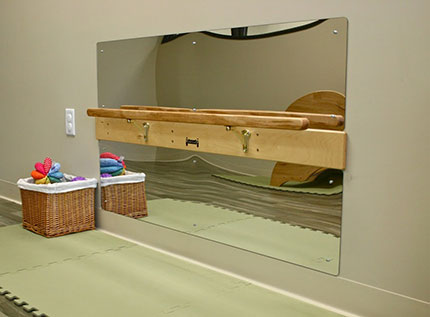
In our experience, we’ve found there are a series of recurring questions from parents of young babies. To help you ferret out what matters as you discuss your options, we thought we’d summarize the six top questions about childcare for babies we hear all the time, and provide our answers.
- If I put my baby in a childcare environment, will he be safe from physical harm and illnesses? With the right childcare arrangements, the answer is a resounding yes! If you entrust your baby to professionals, and choose a childcare program that is designed explicitly around the needs of babies, your child can be at least as safe there as she is at home.LePort’s Montessori infant program offers an environment that is optimally aligned around the needs of babies. Every piece of furniture has rounded edges. Areas where children pull up (and thus may fall down!) are padded with soft floor mats. There are no small objects in the room that could be choking hazards, nor any loose electrical cords. A 1:3 ratio, with four adults in each room, ensures that babies are carefully supervised all the time (although we may flex to a 1:4 ratio when several children are sleeping at one time). When a primary teacher needs a break, a floater will come in to cover, ensuring uninterrupted coverage.
Obviously, when a group of babies are together in a childcare setting, minimizing the risk of contagious illnesses is important. That’s why our infant areas are professionally cleaned every day. Teachers and parents must wear covers over shoes to enter (or switch into inside shoes.) Food is kept strictly separated, surfaces are wiped down regularly, and teachers engage in and teach proper hand washing practices.
That said, you should expect your child to have more common colds in childcare than if she were at home alone. If this is a concern, we encourage you to look into how strengthening her immune system actually has many potential benefits.
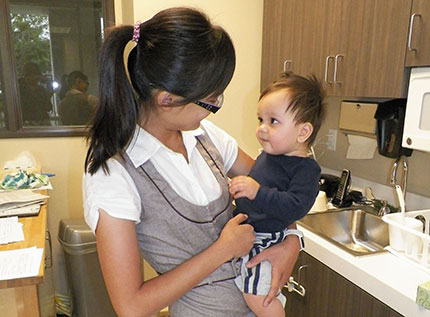
- Will my baby feel loved? Or will she miss her mom and dad terribly while at childcare? We’ll be the first to admit it: no one can love your baby the way you do! Your special relationship with your child is irreplaceable.That said, we think our teachers are as good a substitute to your presences as possible. We select our teachers not only on their knowledge and expertise, but also on how much they love being with infants. But, of course, seeing is believing: we invite you to contact us to schedule a tour, so you can see for yourself how our teachers interact and nurture the babies in their care.
From years of experience, we know that it is often easier to transition a child to childcare early, as a baby, than it is to do so later, during the toddler years. Separation anxiety peaks around 12-18 months. By starting your child in the infant program, you can help her to become familiar with her teacher and new environment prior to that critical phase, making things easier for her and for you.
- My work commitments require me to leave my child for up to nine hours a day, five days a week. Can your program accommodate my work schedule, and offer quality care to my baby for that much time? No question about it: working full time, while you have an infant, is one of the most difficult things you’ll ever do as a parent. You want to be with your baby as much as possible, and rightly so: strong parent-child attachment early on is one key factor to baby’s health.Many parents, though, manage to juggle full-time work and being a great parent. One key factor to being able to attend to work full-time is finding an optimal childcare environment for your baby. We believe LePort does offer such an environment.
The reason is that we know how critical these early years are, so emphatically offer not just childcare, but a Montessori educational program right from the beginning. We replicate many of the things a parent can offer at home, but that often get short-shrift in a typical childcare center.
We invite you to read more about what makes our Montessori infant program unique:
- Learn about what Montessori for infants means, and how it compares to typical childcare.
- Research trade-offs between hiring a nanny and enrolling your bay in LePort’s Montessori infant program.
- Understand how we select our infant teachers.
With the right program, you can leave your child with confidence. We encourage you to do your research!
- My baby has a hard time sleeping. How do you manage naps with so many children in one childcare room? Will he get enough sleep to thrive?We’ve come to believe that parents have this concern in part because of the actual practices of daycare facilities. In many infant program settings, there is a strictly enforced group schedule: all babies eat together, assembly-line style. All babies nap together, at the same time. All babies play together.We do not take this approach at LePort. Instead, we work with you to replicate techniques that work best at home for your child’s sleep patterns, while sharing tips from our experts for optimizing your child’s sleep. Our nap rooms provide a dedicated crib or low floor bed for your child in a peaceful place where noise is minimized and tranquility is heightened. While pacifiers are permitted in younger infant environments, to promote independence and oral health we assist children as quickly as possible to wean from any pacifier use. We also help prevent tooth decay by refraining from placing bottles in cribs, or having children fall asleep while drinking a bottle.
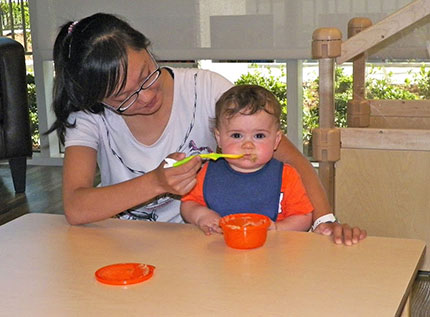
We will rock or hold a young infant who needs such comforting to fall asleep, while working with the child and parents to encourage self-regulation in sleep habits. Our goal is for your child to recognize sleep as a peaceful opportunity to self-soothe and rest because he or she is tired, just as a child will eat when hungry. If your child arrives asleep in a car seat, he or she will be gently placed in a crib or on a floor bed. Children will have the opportunity to awaken from sleep naturally, rather than being awakened by an adult.
- Don’t babies need lots of one-on-one attention during the first year? Will my baby miss out, if he is one of ten or twelve children in a childcare room? Babies absolutely need a lot of attention. That’s one of the reasons why we maintain a 1:3 ratio in our infant program. (When several children are asleep at once, we may flex to the 1:4 ratio typical in other childcare settings.) Still, three babies can seem like a lot for one teacher to love, nurture and cuddle with all day long.We believe a 1:3 ratio is sufficient to allow one-on-one love and nurturing because our whole environment is set up to support our staff and make individualized attention possible. Here are a few things you may want to consider as you decide whether a 1:3 ratio is something you can be comfortable with:
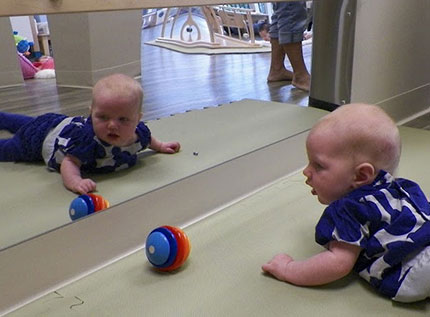
- Our individualized program means not all children have the same needs at the same time. Your child’s primary care provider in many cases will not be feeding three children at once. One of her babies may be asleep, while another one is happily playing with one of our many fun activities, leaving her free to focus on your child.
- Children benefit from some independence, even as babies. Many parents of multiple children will tell you that child #2 has a longer attention span and is more independent. Why? Because she’s never gotten used to having an adult with her, entertaining her every minute of her waking life! Babies actually benefit from the opportunity to explore their environment, to touch things, and to observe, without being actively stimulated by an adult 24/7.
- Older infants often engage in parallel play with peers. While being left to their own devices at home can leave babies bored, in our rooms, there is so much to look at: other infants playing, care-takers feeding children, older babies crawling around. And once baby can sit up, she’ll often be happy playing alongside another little person: it’s socialization in action!
- Additional help is always available. We have a trained Head of School, an administrative team, and “floater” teachers onsite who can be called upon for support any time there are needed.
“It is necessary for the teacher to guide the child without letting him feel her presence too much, so that she may always be ready to supply the desired help, but may never be the obstacle between the child and his experience.”–Dr. Maria Montessori
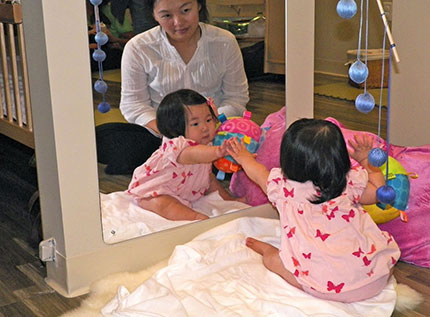
- I’m breastfeeding. How can I keep that up when my baby is in childcare? We support breastfeeding moms to continue breastfeeding as long as is right for you and your baby:
- Moms are encouraged to bring expressed breast milk to school. We’ll store your milk in our refrigerator, and happily feed it to your child while you are at work.
- We will adjust your baby’s feeding schedule to support your breastfeeding. Please let us know when you’ll be picking your baby up: that way, we can make sure he’s not just been fed a bottle when you come and are ready to nurse!
- Moms are always welcome to nurse baby onsite. Our infant rooms all provide comfortable nursing chairs. If you work close by, please feel free to visit during a break, and nurse your baby mid-day.

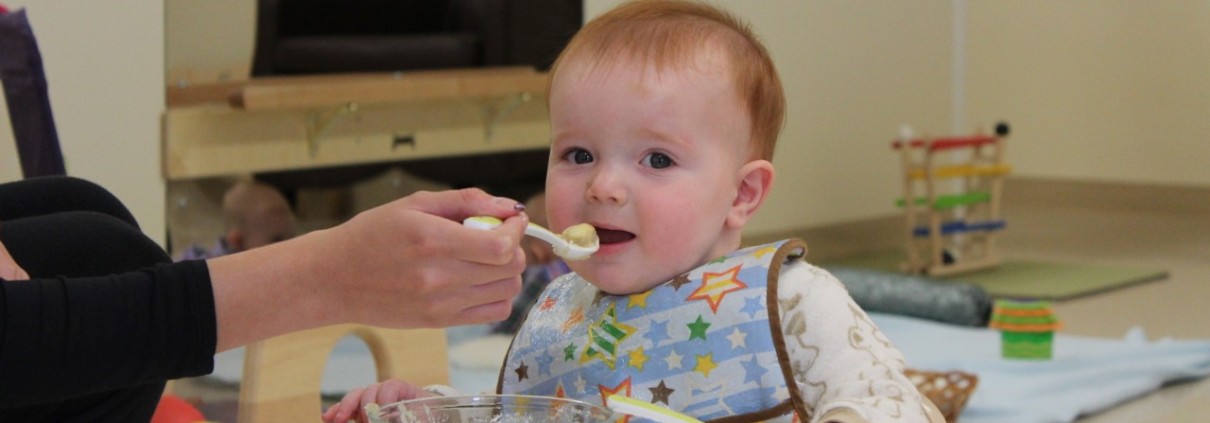

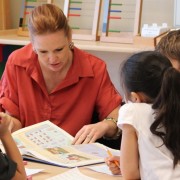
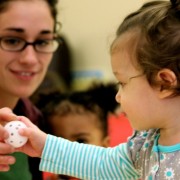
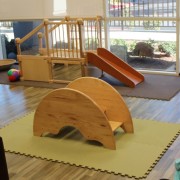
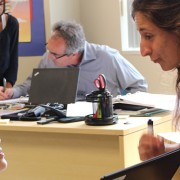
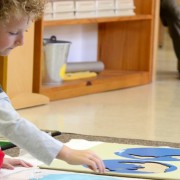

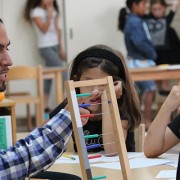



I was thinking about enlisting my small 2 year old into a daycare next year, but I was concerned about how much attention she’ll receive when there are other kids there her age with her same needs. After reading your article, I feel more confident that she’ll be okay since there is a Child: Teacher ratio. I think I’ll look into local child care options for the future.